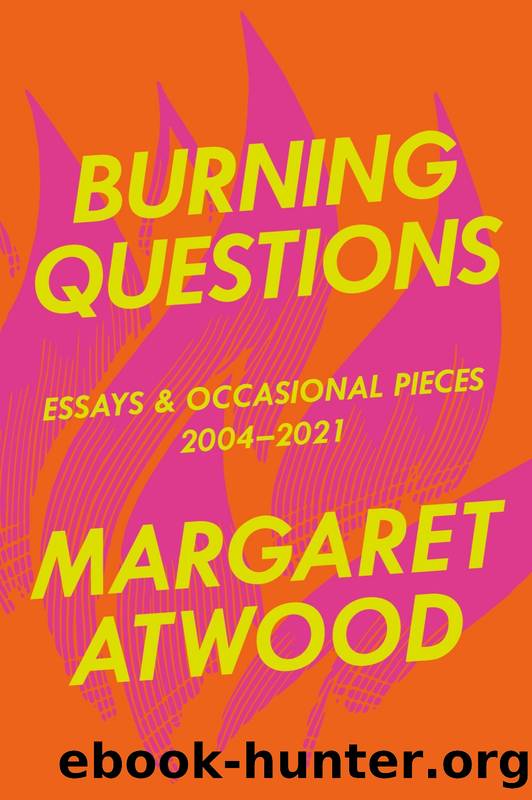Burning Questions: Essays and Occasional Pieces, 2004-2021 by Margaret Atwood

Author:Margaret Atwood [Atwood, Margaret]
Language: eng
Format: epub
ISBN: 9780771096419
Publisher: McClelland & Stewart
Published: 2022-03-02T00:00:00+00:00
(2015)
This year is the thirtieth anniversary of The Handmaidâs Taleâs publication, which is amazing to meâit doesnât seem that long ago. Over that thirty years, this book has been published in approximately forty countries, and translated into approximately thirty-five languages. I say âapproximatelyâ because new ones keep popping up.
But things were slower at the beginning. Iâd say the first reviews, in the English-language countries at any rate, were so-so. The Handmaidâs Tale is not a very cozy book. Itâs not the sort of book in which you fall in love with the sprightly, courageous, but conscientious heroine and approve of everything she does. Pride and Prejudice it isnât. In fact, it got dissed in the New York Times, and being dissed in the Times invariably causes your publishers to cross to the other side of the street when they see you and then run away very fast and hide under a rock. The reviewer was the eminent American novelist and essayist Mary McCarthy, and she was not amused. (She was not amused in general, so I was not alone in failing to amuse her.)
Her review was somewhat incoherentâthe Times told me later that she had recently had a stroke, though they hadnât known that when they assigned the review. She did agree that we should be wary of our credit cardsâthey were rather new then, back in 1985, having been deployed en masse only in the 1970sâbecause such cards, if we came to rely on them and only on them, could so easily be used to control us. And this was even before the Internet! We didnât even know about digital signatures.
But apart from the credit card angle, Mary McCarthy found the tale implausibleâsurely such a retrograde thing could never happen, in the forward-looking United Statesâand she also found the language uninventive. Her review was somewhat of a blow to me, as I remembered reading her novel, The Group, back in 1962, in the bathtub, with considerable interest. But it wasnât the first time Iâd had a bad review, and it would not be the last. What doesnât kill you makes you stronger, though it sometimes also makes you more peevish. As you have just seen.
But after that rocky start, other commentary on The Handmaidâs Tale appeared. The general import was: In the United Kingdom, they thought it was a pretty good yarn. They werenât too bothered by the prospect of its scenario actually happening in the U.K., as theyâd already done their religious civil war, back in the seventeenth century, and they werenât anticipating another one anytime soon. In Canada, they asked nervously, âCould it happen here?â Itâs the sort of question Canadians often ask, since they imagine their country as the Land of the Hobbits, where the little furry folk innocently drink beer and play hockey and smoke pipeweed and have jolly parties, thinking no harm, and where the evil Eye of Mordor has not yet located them and sent trolls and orcs and Nazgûls and whatnot to exterminate them.
Download
This site does not store any files on its server. We only index and link to content provided by other sites. Please contact the content providers to delete copyright contents if any and email us, we'll remove relevant links or contents immediately.
The Rules Do Not Apply by Ariel Levy(4953)
On the Front Line with the Women Who Fight Back by Stacey Dooley(4856)
The Lonely City by Olivia Laing(4796)
Bluets by Maggie Nelson(4542)
The Confidence Code by Katty Kay(4245)
Three Women by Lisa Taddeo(3419)
Not a Diet Book by James Smith(3409)
Inferior by Angela Saini(3310)
Confessions of a Video Vixen by Karrine Steffans(3295)
A Woman Makes a Plan by Maye Musk(3241)
Pledged by Alexandra Robbins(3169)
Wild Words from Wild Women by Stephens Autumn(3136)
Nice Girls Don't Get the Corner Office by Lois P. Frankel(3034)
Brave by Rose McGowan(2817)
Women & Power by Mary Beard(2763)
Why I Am Not a Feminist by Jessa Crispin(2737)
The Clitoral Truth: The Secret World at Your Fingertips by Rebecca Chalker(2708)
The Girl in the Spider's Web: A Lisbeth Salander novel, continuing Stieg Larsson's Millennium Series by Lagercrantz David(2706)
I Who Have Never Known Men by Jacqueline Harpman(2606)
